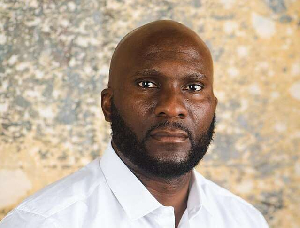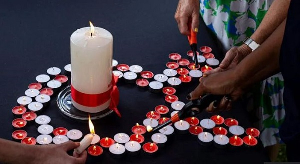Let them be, we have been told. What two consenting adults do within the confines of their room/privacy is no one’s business? Is it really true? Can two persons or even one who decides to commit suicide be said to act such that others are not affected? This cannot be true. Recently, the subject of homosexuality in Ghana has gained currency in the media – print, news, Internet, etc. Is there any such thing as a definitive position we can take on the subject? Methinks there is and I hope to make a case for such in this piece.
I’ll begin at rape and attempt to build a bridge to homosexuality – please indulge me. I have yet to meet an association of people who consent to rape or even suicide. It is probably safe to say, without empirical figures/research, that 9 out of 10 people will be opposed to rape or suicide. But why would they be? Somehow we have bought the idea that there are no absolutes in life but do we not uphold the very same when we condemn any such acts of rape or suicide?
Imagine with me that a paedophile takes the liberty to rape your ten year old son or daughter. Would you still hold the opinion that people are at liberty to do as they please? You would not only be incensed but would fight to your last breath to ensure that some form of justice is dispensed. The question is why would you be irked when in your opinion people can do as they please? Invariably, you, by your actions are suggesting there is something that is right and something that is wrong and that offenders deserve punishment. If this is so then I propose as a premise that in matters of morality there is such a thing as right and another as wrong. People are not at will to choose erratically what they would define as right or wrong.
I cited suicide earlier to press home a point. Some schools of thought have tried to propose “man spaces” suggesting that we are self-contained units who can do as we please. That, to some is the epitome of wisdom but to me is hogwash. If we choose not to dabble in the ethics of suicide, can one hang themselves and not affect others? If not emotionally, someone must pay for the morgue in which he/she will be kept and the unplanned burial and funeral service. If the effects of our actions can truly be confined to ourselves only, then we can argue that people, particularly the gay, can do as they please.
Several years ago, I read the late Dr Dela Attipoe’s research on Men who have sex with men (MSM) and HIV/AIDS in Ghana. He closed that work with words that have stayed with me since, “denial or wishing it away is not the solution.” As I read the headlines and follow the various discussions on the radio, the evidence seems to point to the fact that we have denied it and tried hard to wish it away but alas, the skeletons have emerged from the closet. From primary school students all the way to our tertiary institutions and beyond, homosexuality has hit us hard. Just last week, thousands who were supposedly involved with MSM were registered and a large fraction of them had AIDS according to the report. Did no one follow up on Dela Attipoe’s work? That will be the subject of another piece.
On the 6pm radio news (June 2, 2011), a mother in the Western Region told of her teenage son who had sexual relations with a much older gay partner. What resulted are incontinence and other complications that prevented the child from sitting for protracted periods. He could not continue with school because of the difficulty in sitting. Amidst tears, his mother pleaded for (medical) assistance to help her son sit and continue his education. There was a tinge of rage and disgust in her tears; she was evidently displeased with her son’s gay lifestyle. Whose fault is it?
The nature/nurture debate is one I have written about prior and will not attempt to delve into. Scores of books and scholarly work have been written which express quite solidly the various issues. One thing that emerges is that the evidence tilts heavily in favour of nurture than it does nature. I personally think Science will never be able to prove a “gay gene.” That said we need to ask ourselves the way out of this conundrum. Let us see if we can understand this whole subject from a different paradigm.
To continue along this line, I think it is helpful for us to realize that homosexuality itself exists along a continuum. Traditionally, we think all homosexuals have brutal anal sex destroying their sphincters and walking around incontinent. Nothing, in my opinion, could be farther from the truth. I know, in my own experience and that of several that I have read that there are gay people who will not and do not have anal sex. We may call those who engage in brutal anal sex and bisexual sex those at the extreme end of the continuum. At the other end, however, are those who have a proclivity and yet never act them out.
I propose then that we need to understand that people begin from the state of proclivity before they ever get involved in any activity. They fantasize and either end up acting out their fantasies or staying within socially acceptable limits often because of fear. This whole continuum needs to be taken into consideration when we attempt to tackle the subject of homosexuality.
I find it worrying then the current approach to treating the subject- the approach that lumps everyone into one group. I hear renowned clergy say things like “homos are filthy” and other lawyers advocate for “rights” and I wonder whether or not they are grasping the situation in all its extents. When someone says “homos are filthy,” the question I must ask is “which homos?” Is it the ones engaged in homosexual acts or those with a proclivity who might have a stronger inclination to change? When a lawyer advocates rights, is he truly speaking for the entire homosexual community? Are there not some in this supposed “community” who have no interests in “rights” as we have come to know it but have an interest in a “right to help,” may be?
I suggest, and audaciously so that we are far from solving this problem if we continue along this name-calling, rights-flaunting route. We must employ spiritual and scientific means to minimize this canker. I’m careful to say minimize because we cannot by any means eliminate vice completely, at least not on this (imperfect) side of eternity. To keep this current piece to a small size, I’ll propose some general thoughts. Later, I will write on the paradigm shifts that are needed from a Christian perspective in order to help the Church help its own people. I’ll leave the psychologists and other experts to deal with Science.
Distinguish between proclivity and activity, extend love and provide healthcare
As already mentioned, we need to distinguish between proclivity and activity. Too often, once we hear the word “gay” or homosexual our minds swim along to some fetish and horrid sexual acts. In my brief years of counselling, I can conclude that there are people who have these tendencies who are too trepid to act them out. There are those who have a moral framework that tells them they cannot and should not act them out. We must include these people as we attempt to make statements about homosexuality. We may end up driving them deeper into the community where they might find acceptance at the added cost of full-blown homosexual behaviour. Our statements must reinforce their moral framework and enable them to be confident enough to seek help and support.
The unanswered question is: will they find “acceptance” in the truly hostile heterosexual community? Let me attempt to drive this home. As a parent, have you created an enabling environment in which your son or daughter can walk confidently to you to discuss his/her struggles? Will they find love and acceptance and a willingness to work through the issues till some semblance of “deliverance” is attained or will they find some condemnatory lectures awaiting them? As a Church or mosque, will our response be similar or it will push them further?
I am yet to read any research paper on the statistics of those willing to change their professed homosexual orientation. I am not certain whether extensive research has been done in this area. I surmise the figures for those who want to change may be equal if not higher to those who do not want to change. I again suggest that even the die-hard homosexual has a moral compass that makes him/her pliable to change. The point is if our homes, churches, mosques, etc. are accepting and walking beside our sons and daughters to receive help and some change, the entire population may not change but there will be one less homosexual each time we win. Of course, we should realize this is not a process that happens overnight, in most cases.
One thing we must constantly remember is that the need for same-sex love or acceptance is not in itself evil. It is as one author notes, the “eroticization” of those needs that leads to a problem. If we can grasp this principle, we may better embrace the need for acceptance and love among these strugglers and better extend a helping hand. This is the approach I expect the religious bodies to adopt. I refer those who profess Christianity to again reflect on the account of the woman caught in adultery in John 8. It will be instructive as regards our present approaches.
On the issue of healthcare, I think we should not waver but make certain we provide as much healthcare as possible. We provide health care to sufferers of HIV/AIDS and to the best of my understanding, there is no discrimination as to whether reckless sexual behaviour caused it or some other fluid transfer. We owe it to ourselves to provide healthcare in the hope that we can keep them alive longer to make one less homosexual.
On law, some of the arguments fall apart at the seams. I have watched with shock as some lawyers have attempted to say lesbianism is ok in comparison to (male) homosexuality. Their arguments border on penetrative sex. My question to these lawyers is, if two males indulge in non-penetrative homosexual acts (e.g. fellatio) can we grant them liberty to be free as we would lesbians? Anchoring our legal or even moral judgement on “fickle” things as “unnatural carnal knowledge” proves a bit problematic. Oral sex, phone sex and a variant of other activities may quickly fall under this bracket. We will be forced then to agree with Prof. F.T. Sai. We will have to set up a whole unit under the Police Service for spouses to report the amount of unnatural carnal knowledge they have experienced. A work colleague quipped, the whole thing (sex) should then be a hit and go affair.
We must thus look again at the whole issue of sex and anchor our moral framework on something or better yet someone who transcends us and enables to look at sexual acts in a fuller view. Once we can find this absolute from which to construct our moral framework, we will not need something as weak as unnatural carnal knowledge but will have a more solid framework from which to proceed. While these lawyers and homosexual pundits argue their case, they invariably make absolute statements and thus confirm such a thing as an absolute and by implication an absolute moral law Giver. We thus re-evaluate our moral framework if we can understand fully the ramifications of sex, not just homosexual sex but heterosexual sex.
I have tried to paint a picture of the scene in the preceding paragraphs. We now have the challenge of getting our hands dirty and being vulnerable enough to help. We now have to think about our moral framework, our traditional Christian and Muslim approaches and dare those ready to pelt to cast their stones if they have no sins of their own. It is time for us to establish not only for homosexuals but heterosexuals as well, the moral framework through which they must interpret their sexual desires and acts. It is time for us to quit pointing the fingers and extending our hands to help our brothers and sisters in need.
July 6, 2011 0748AM
sschandorf@hotmail.com
Opinions of Tuesday, 19 July 2011
Columnist: Schandorf, Sidney Laud














